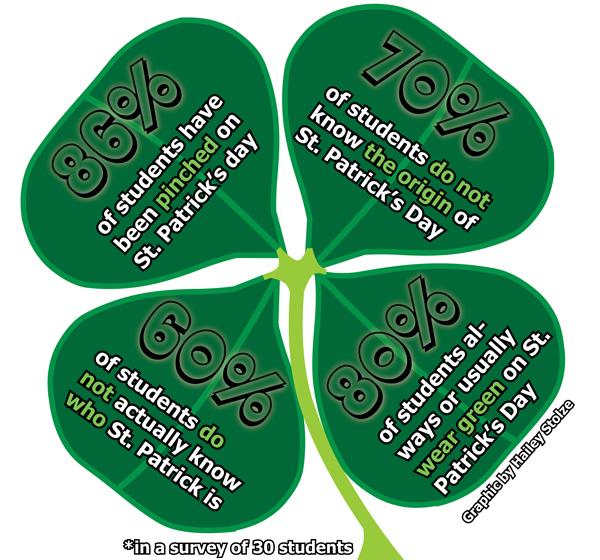Every year Mar. 17 is day a celebration, and has been for over 1,000 years. In a survey of 30 students at Bellevue West, 70% of students did not know the origin of St. Patrick’s Day. Though many celebrate the holiday, not many actually know what they’re celebrating.
“[I thought it was] kind of similar to Valentine’s Day,” junior Emily Grubb said.
Grubb is exactly right. Though the two holidays are quite different, they are both Catholic holidays that unreligious people recognize and celebrate. 83% of students do not celebrate St. Patrick’s Day as a religious holiday.
Freshman Liam Duguay is Catholic and always celebrates the holiday, but isn’t exactly sure why St. Patrick’s Day is on Mar. 17.
“I thought [St. Patrick’s Day] was either [St. Patrick’s] birthday or the anniversary of when he was killed,” Duguay said.
It is the feast day and death anniversary of St. Patrick, yet over time this religious celebration has lost its religious tradition and transformed into a day filled with festivals.
“I can’t remember what he was the patron saint of, but my little brother thought he was the patron saint of the color green,” Duguay said.
St. Patrick is actually the Patron Saint of Ireland., according to www.americancatholic.org. He loved the shamrock because the three leafs represented the Catholic Trinity. He lived during the fifth century, and was kidnapped and taken to Ireland at only 16-years-old where he was forced to be a slave. Eventually he escaped but later returned to Ireland.
Over 100 St. Patrick’s Day parades are thrown across the United States each year, according to www.history.com. However, some still remember the holiday is a religious celebration.
“My parents and I pray to St. Patrick and then we eat something green. We eat broccoli, or one year my mom made jelly that was green,” Duguay said.
Sophomore English and Creative Writing Teacher Britton Sullivan said he is roughly 90% Irish, and his family is from County Cork, Ireland. After his great grandfather came over to America, he dropped the O’ before his last name and converted from Catholicism to Protestant to fit in and “Americanize himself.” Sullivan’s wife celebrates St. Patrick’s Day by making him corned beef, cabbage and Irish bread for their big family meal. He said it’s like Irish Thanksgiving.
“We see it as a family holiday to celebrate culture, rather than go out and get wasted,” Sullivan said.
When Sullivan does take part in Irish celebrations, he sometimes get offended by how people act.
“People trivialize the importance of it, and then it also perpetuates the stereotype of Irish drunkenness,” Sullivan said. “There’s way more to Ireland than alcoholism.”
He also said he’s gotten into arguments with people before because many people don’t know the true origin of St. Patrick’s Day.
“Everybody has this weird notion that we celebrate St. Patrick’s Day because he chased the snakes out of Ireland, and I don’t know what that’s about. St. Patrick’s Day is based on St. Patrick bringing Catholicism to Ireland,” Sullivan said.
Sullivan explained how bringing this Catholicism to Ireland brought about a great division between the Catholics in the south and Protestants in the north. Some were forced to leave their old beliefs behind and adapt a new religion.
“It’s led to silly things like the Irish flag: You’ve got orange on one side, green on the other and you’ve got white in the middle. It’s because they need to separate the Catholics from the Protestants; the orange is Protestant, the green it Catholic,” Sullivan said.
The Great Potato famine in Ireland of 1845 caused more tension between the Catholics and the Protestants. Sullivan said that some Protestant food organizations would open up soup kitchens in the south, but would put meat in the soup on Fridays, because many Catholics didn’t eat meat on Fridays. They would tell them that if they were really hungry, they would eat the soup.
Though many celebrate St. Patrick’s Day, not many know the true origin of the holiday, nor who St. Patrick actually was. The holiday continues to recognized and celebrated by many who aren’t religious, yet they don’t know what they’re celebrating.
Story by Website Editor-in-Chief and West Wind Commentary Editor Hailey Stolze with additional reporting by Yearbook People Section Editor Katie Begley.





















